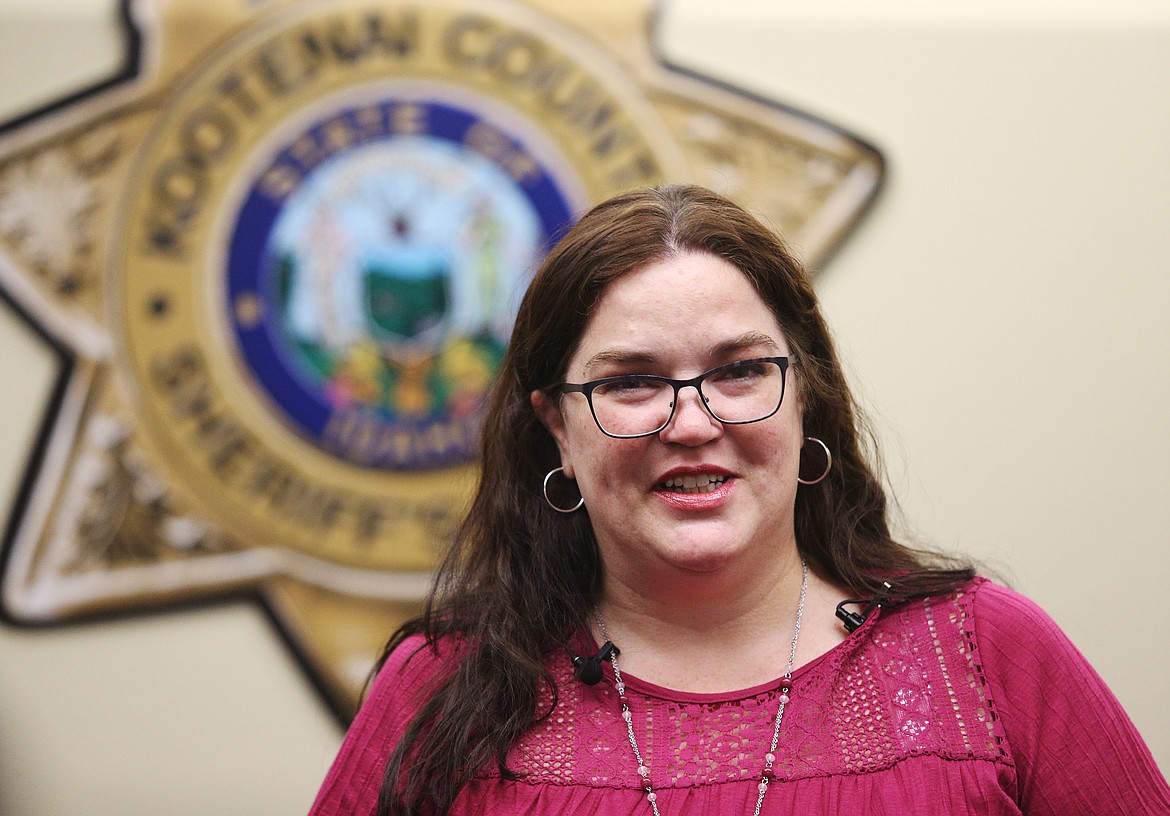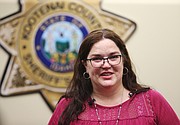When terror calls - and courage answers
By DEVIN WEEKS
Staff Writer
COEUR d’ALENE — Not all heroes wear capes.
Some of them, like Kootenai County Sheriff's Office emergency communications officer Talina Moyer, wear headsets.
"Sometimes you forget that it is a very important job and then you get that one call," Moyer said during a press conference at the KCSO communication headquarters Tuesday afternoon.
That one call came in the middle of a late-August day.
Moyer, of Coeur d'Alene, found herself on the phone with a woman whose car was filling up with water. The caller had fallen asleep at the wheel and crashed into Lake Coeur d'Alene. She needed Moyer to guide her out of the vehicle, and every second mattered.
"When I got the call, it was surprising," Moyer said. "That was not the call I was expecting, for sure."
Moyer, who has worked as an emergency communications officer for 12 years, kept her cool and talked the woman through the terrifying incident. She instructed her to open the rear window and get out that way.
"The engine causes the front end to sink,” Moyer said, adding that the rear window of a sinking vehicle allows the best chance for a safe escape.
Generally, 911 dispatchers have to immediately confirm a person's location. But something Moyer learned in training broke through to help save the woman's life: the dispatcher in the training call was so focused on location that the victim was not instructed to leave the vehicle and drowned.
"I didn't realize how much that call had stuck with me until I started talking to her," Moyer said. "Immediately, I went to my instructions to tell her to get out."
Moyer directed the woman to safety and stayed on the phone with her until emergency responders arrived. Once she could get off the phone, Moyer needed some air.
"I definitely started to choke up at the end when I was talking to her about her name and she asked me my name and she said, 'Thank you.' I was definitely choking up, and I did kind of have to come outside to have a few tears and just walk a little bit and let that all out and go back in," Moyer said. "I guess the adrenaline going through me, I was surprised at how that had affected me at the end.
"You have to remember you’re there for the person who needs the help. You do have to hold back whatever you have going through until after the call," she said. "I was kind of there with her. I was just so relieved when she was safe."
Moyer's courage and cool-headedness earned her a global award — the International Academies of Emergency Dispatch Call of the Week. The honor highlights dispatchers around the world who correctly follow established protocol and provide excellent customer service to callers and patients with urgent needs.
"I was actually sitting in our kitchen right outside of the dispatch room when the call happened, so I knew the call was happening. You could hear it, and then when I knew Talina was going outside, you could tell her emotions were very high,” KCSO Lt. Stu Miller said. "You have a whole different appreciation for the job when you actually see these guys work."
Moyer said it was a team effort.
"My supervisor got on the call and was listening and working on our phone map trying to get her location while I was speaking to her,” Moyer said. "My partner took over my radio channel so that I could focus solely on that phone call and help her."
She also gives props to the woman, who remained calm, followed instructions and even joked that "things could be worse" toward the end of their conversation.
"She did everything that I asked," Moyer said. "Things could have been worse, and she was safe, and she realized that. That was really cool to hear.”
Miller said Moyer has also been nominated for a life-saving award through her department.
"You never know who’s going to be on the other line of the phone," he said. "It could be somebody that’s reporting their neighbor’s dog barking or whatever, or you could have somebody that just crashed into the lake, and so you pick up the phone not knowing what’s going to happen."
Moyer said this call serves as a reminder about how much she loves her job and why she keeps coming back. She and the caller have never met, but Moyer will always remember the call because it was so different from any others she's taken.
"I’m glad that I did it properly and that she was OK," Moyer said.
The IAED is a global certification organization for emergency communications with more than 64,000 members in 46 countries. More than 3,500 communication centers in 23 languages employ IAED's protocol and training in medical, fire and police dispatching.



